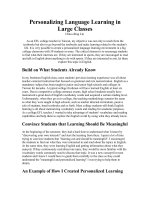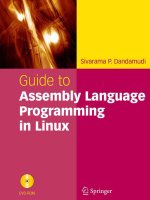New language features language changes in c++17 – medium SNEAKPEEK
Bạn đang xem bản rút gọn của tài liệu. Xem và tải ngay bản đầy đủ của tài liệu tại đây (2.77 MB, 42 trang )
Adrian D. Finlay
The West Indian Programmer. Java Enthusiast. Software Engineering, Hair, Travel, Business &
Entrepreneurship & much more. Network w/ me @ />Draft
New Language Features & Language
Changes in C++17
The never ending journey into learning C++ features….
Giphy: FELIKS TOMASZ KONCZAKOWSKI GIF
C++ is a general purpose, multi-paradigm, compiled language that
was invented by danish computer scientist, Bjarne Stroustroup, and
released in 1983. C++ marries classes, such as those found in Simula
with the majority of the C language, to create a language that is like an
Object Oriented version of the C language. C++ is among the most
widely implemented and widely used languages in the history of
modern computing.
In my opinion, it is best suited for systems programming, embedded
programming, high performance computing, resource constrained
computing (think tiny devices), & the development of low level APIs,
language compilers, interpreters, device drivers, & the design of
software infrastructure.
Typically, the choice to use C++ is predicated by the need for
performance & efficiency (little bloat, efficient use of resources and
implementation constructs, getting as close to the metal as possible).
For better or worse, C++ is ideologically flexible — it does not
constrain you to programming in one paradigm such as many other
languages. It contains a bevy of features, which is a frequent source of
criticism by certain members of the programming community. C++ is
an outlier of sorts in that the philosophy behind C++ embraces
including good ideas from many different ideological perspectives as
opposed to the KISS (Keep It Simple Stupid) philosophy which is more
oriented towards having one simple way to do one thing.
C++ is also used for common Desktop Application Software. C++ has
found widespread use in truly massive systems. For example: Google
Chrome, Mozilla Firefox, Telephony Infrastructure, Chrome V8, and
much, much more. Read Stroustrup’s (incomplete) list here. C++
might be a better decision than using C for many reasons, the most
popular of which, in my opinion, are the various abstractions that C++
provides, most notably, the class. The class allows for highly structured
programs that bind data and the functions that act on such data. This
often makes for more organized programs than the C equivalent.
The upcoming revision to the ISO for standard is C++17. It will ship
with 26 new language features and 4 deprecated features (PLEASE
correct me if I am wrong on any of this!). The industry leading
compilers (GCC, MSVC, Clang) have already implemented many of the
new C++17 features ahead of it’s general release [3]. The list of new
features presented in this article has been generated from several
sources [1][3][4][5][6][7]. C++ is expected to ship sometime this
year (2017) [7]. You may track it’s current ISO approval status, here.
C++17 is a major feature release, the largest such release since
C++11.
New Language Features
1. Addition of __has_include macro
2. UTF 8 Character Literals
3. Hexadecimal Floating Point Literals
4. New rules for deduction of single member list using auto
5. Update to __cplusplus value
6. inline variables
7. New Syntax for Nested Namespace definitions
8. Initializers added to if/switch statements
9. constexpr if
10. New standard attributes [[fallthrough]], [[maybe_unused]] &
[[nodiscard]]
11. Attributes for Enumerator & Namespaces
12. Error message for static_assert now optional
13. Structured binding declarations
14. Keyword typename now allowed in lieu of class in a template’s
template paramater
15. Constant evaluation for non-type template arguments
16. Class template argument deduction
17. Extensions on over-aligned Memory Allocation
18. Fold expressions
19. List-style Initialization of Enumerations
20. Specifying non-type template parameters with auto
21. constexpr lambda expressions
22. Lambda this by value (*this)
23. Extending Aggregate Initialization to Base Types
24. Unknown Attributes Required to be Ignored
25. Pack Expansions legal in using declarations
26. Generalization of Range-based for loop
Deprecated Language Features
1. Removal of Trigraphs by default
2. Removal of deprecated Increment Operator (++) for bool type
3. Removal of deprecated register keyword
4. Removal of deprecated Dynamic Exception Specifications
Check with this list often to see compiler support for the various
language changes! [3] You can find information about GCC C++17
support here, and LLVM/Clang C++17 Support here. Please note that I
will be covering C++ language features only and will not discuss the
various changes to the standard library.
Why so many features Bjarne? Maybe one day he’ll tell me.
GfyCat: “Stroustrup” (Taken from BigThink YouTube Video)
The Compilers I’ll be using
I will be using GCC version 7.2.1 and Clang (LLVM) version 5.0.0, both
the latest versions of the respective compilers as of this publications
posting, to test and run my examples. A testament to C++’s breadth,
both of these compilers are themselves written in C++! Both
compilers are part of a suite of tools providing compiler support for
several different languages on several different architectures. I will
be compiling and running the code on bash on my SUSE Linux box.
I’ll post the code first and the output in bash second. Let’s start with the
New Language Features.
New Language Features
1) Addition of __has_include macro
The macro __has_include (added in C++17) allows the programmer
to check the availability of a header to be checked by a preprocessor
directive.
Notice the comments from Ln. 5–10. We must check for C++17
support. For example, std::any is only available in C++17. Otherwise
this will happen:
This works with both LLVM/Clang as well as GCC.
2) UTF 8 Character Literals
C++17 introduced UTF-8 Character Literals.
From Linux Mint.
3) Hexadecimal Floating Point Literals
C++17 introduced support for Hexadecimal Floating Point Literals.
You may find out more, here.
4) New rules for deduction of single member list using auto
C++17 introduced a more common sense deduction of types using
auto for single member lists. Previously, the deduction of single
member lists evaluated to std::initializer_list<x> where x was the
actual type originally in the list. In C++17 this is more intuitively
deduced directly to x for single member lists.
5) Update to __cplusplus value
The value of the predefined MACRO __cplusplus has chanaged to
201703L reflecting the update in the language standard.
6) Inline variables
C++17 introduced additional functionality to the inline specifier. You
may now use the inline specifier with static class members or
namespace-scope variables to declare the variable as an inline variable.
Also, a static class member variable (not a namespace -scope variable)
marked constexpr is implicitly an inline variable [8] . This functionality
was previously only available for functions. You will want to read more
about this here.
Notice the warnings with C++14.
7) New Syntax for Nested Namespace definitions
C++17 introduced the use of the scope resolution operator to create
nested namespaces. This makes for much less verbose code.
8) Initializers added to if/switch statements
C++17 introduced for initializers in if and switch statements. This is
allows for more concise syntax for common coding activities such as
initializing a value outside of an if statement. Often, what we really
want is for the variable to be local to the if statement or switch-case
statement. Initializers solve this design issue.
9) constexpr if
C++17 introduced constexpr if statements. This allows for explicit
compile time evaluation of the if condition. A list of constant
expressions are available here.
Notice the failure if we use if constexpr:
10) New standard attributes [[fallthrough]], [[maybe_unused]] &
[[nodiscard]]
C++17 introduced three new standard attributes. You will see a
demonstration of their use below. A list of the standard attributes,
including an explanation of the three new standard attributes are
available here.
11) Attributes for Enumerator & Namespaces
C++17 introduced support for support for Attributes on Enumerators
& Namespaces, which were formerly illegal.
12) Error message for static_assert now optional
With C++17, the error message in the keyword static_assert is now
optional. Notice the warning in C++14.
13) Structured binding declarations
C++17 introduced initialization by deconstruction of a tuple like
object with auto. The values are bound to the original object.
14) Keyword typename now allowed in lieu of class in a template’s
template paramater
C++17 now allows the use of the keyword typename in lieu of class in
a template’s template parameter. Curiously enough, while Clang, by
default, will warn you about the potential illegal use of the keyword
template in the aforementioned situation in C++98, GCC does not
does not do so by default.
15) Constant evaluation for non-type template arguments
C++17 now allows constant evaluation for non-type template
arguments. You should read more about this, here.
For some reason GCC does not play well when I call the function within
the template parameter declaration. However it works on other
compilers, and clang has no problem with it. I tried many things
(providing a public, default constructor/destructor) to no avail. GCC is
reputed as being a strict compiler. If you can figure out the issue, please
inform me in the comments.
UPDATE: Several people have run the code with GCC, including one
person who ran it on SUSE linux with GCC 7.2.1 so the issue may be
local to my installation.
16) Class template argument deduction
C++17 introduces argument deduction for class template
instantiation. Users of languages such as Java, C# may find this
familiar. You will want to read more about this feature here. Some basic
usage is demonstrated below.
It appears that GCC hasn’t yet implemented this feature. I could be
wrong, but it appears that way. Perhaps there is a switch that needs to
be enabled. If you can get this code to run on GCC, do let me know.
17) Extensions on over-aligned Memory Allocation
C++17 overloads the new operator to provide support for correctly
dynamically allocating over-aligned data. Intel’s compiler had
supported this feature by way of their own work <aligned_new>. You
may view the paper here. I also strongly recommend checking out these
pages for more understanding as to the changes in memory
management C++17: std::aligned_alloc , std::align_val_t, std::align.
Lastly, you should look at the description about how the new operator
has been overloaded to reflect these changes.
18) Fold Expressions
C++17 overloads the new operator to
19) List-style Initialization of Enumerations
C++17 now introduces an optional attribute specifier sequence in
initializing enumerations.
20) Specifying non-type template parameters with auto
C++17 now allows you to specify non-type template parameters with
auto.









